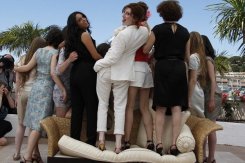 "House of Tolerance", directed by Bertrand Bonello, recounts the day-to-day life of a so-called "maison close" (closed house) where 12 women struggle hopelessly to pay off their debts to their madame, who herself faces eviction.
"House of Tolerance", directed by Bertrand Bonello, recounts the day-to-day life of a so-called "maison close" (closed house) where 12 women struggle hopelessly to pay off their debts to their madame, who herself faces eviction.One of the "women" is 16-year-old Pauline, played by Iliana Zabeth, who arrives from the provinces to work in the Apollonide bordello at her own request, complete with a letter from her parents vouching for her age.
She is introduced to the daily grind, told not to lose weight and is the only woman in the film who manages to escape what is effectively bonded labour before the Apollonide is closed down at the dawn of the 20th century.
After trying to make a film 10 years ago on the reopening of brothels, Frenchman Bonello's partner Josee Deshaies, who is also the film's director of photography, suggested doing a bordello film from an historical standpoint.
Bonello, who made the 2001 sexually explicit Cannes entry "The Pornographer", told journalists that previously representations of the prostitute have always been made by their male patrons.
"We have images of 'maisons closes' from paintings, ideas that come from texts... but they're all from men's perspective: painters who went home and painted, writers who went home and wrote.
"What I wanted to do was to have the women's view on the men who are looking at them."
The women have no control of their destiny, they face arrest for soliciting if they leave the brothel alone. Some hope for a client to fall in love with them, others end up mutilated by customers who will never be prosecuted.
The clients are all wealthy, representing the European world of aristocratic privilege and decadence that existed before the socialisation of World War I.
"It's about the disappearance of a place, of an era, the 19th century is ending and the 20th century arrives. But the 19th century ends with ideas that are completely false about the 20th century," says Bonello.
The men in the film discuss the culture of the time, from the alien attack of H.G. Wells' "The War of the Worlds" to a purportedly scientific work that find similarities between the sizes of prostitutes' and criminals' brains.
A client recommends that Hafsia Herzi's Samira read the book, and when she does, she weeps at its conclusions.
The women are terrified by the doctor's regular public health inspections: before penicillin, syphilis is a death sentence, while pregnancy would leave them without a job.
Few scenes do not feature at least partial nudity, but it is more often the casual nakedness of a large household than explicit eroticism.
"We were like in a family... there was no prudishness, we laughed a lot and besides, we were all in the same frame," said Herzi, who stars in "The Source", also in competition at Cannes.
The film is interspersed with anachronistic soul tracks, which Bonello says "touch on black slavery", and classical music.
But the director insists the film is not trying to open up a debate on prostitution, on the relative values of brothels and street walking, despite its closing video footage of roadside sex workers in Paris today.
0 comments:
Enregistrer un commentaire